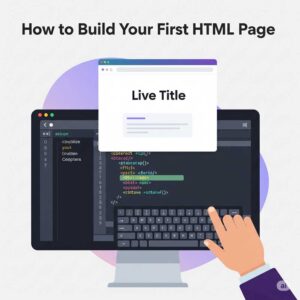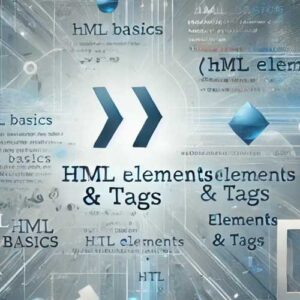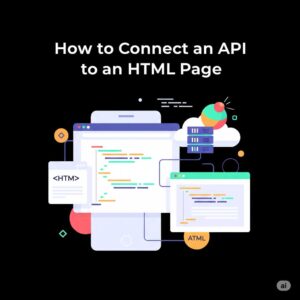Introduction
Imagine visiting your favorite website, reading a blog, or watching a video online. Have you ever wondered what makes all these elements possible? The answer lies in HTML, the backbone of every website you visit. Whether you’re a budding developer or just curious about how websites work, understanding HTML is your first step into web development.
This blog will explain HTML, its importance, and how to start today. 🚀
What is HTML?
HTML stands for HyperText Markup Language. It’s not a programming language but a markup language used to structure content on the web. Think of it as the skeleton of a webpage. It tells browsers like Google Chrome, Firefox, or Safari how to display text, images, videos, and other elements.
HTML uses tags to organize content. For example:
<h1>This is a Heading</h1>
<p>This is a paragraph of text.</p>- <h1> tells the browser this is a heading.
- <p> defines a paragraph of text.
Simple, right? Let’s dive deeper!
Why is HTML Important?
HTML is the foundation of every website. Here’s why it’s so powerful:
1. Easy to Learn 📚
HTML is beginner-friendly. You can create a basic webpage with just a few tags.
2. Works Everywhere 🌍
Every browser understands HTML, making it universal.
3. Essential for Web Development 💻
If you plan to become a web developer, HTML is your first stop before learning CSS and JavaScript.
4. Organizes Content 🗂️
From headings to images and links, HTML structures your content logically.
How Does HTML Work?
HTML works by using tags that tell the browser how to display content. Tags come in pairs:
- Opening Tag: <tag>
- Closing Tag: </tag>
For example:
<b>This text is bold</b>Here, <b> makes the text bold, and </b> closes the tag.
HTML Basics: A Quick Start
Here’s what a basic HTML webpage looks like:
<!DOCTYPE html>
<html>
<head>
<title>My First HTML Page</title>
</head>
<body>
<h1>Hello, World!</h1>
<p>This is my first webpage using HTML.</p>
</body>
</html>What’s Happening Here?
- <!DOCTYPE html>: Tells the browser we’re using HTML5.
- <html>: The root element of the page.
- <head>: Contains meta information like the page title.
- <title>: Sets the title displayed in the browser tab.
- <body>: Contains all the visible content like headings, text, and images.
When you open this code in a browser, you’ll see:
Hello, World!
This is my first webpage using HTML.
What Can You Do with HTML?
With HTML, you can:
✅ Add headings and paragraphs
✅ Create clickable links (<a> tags)
✅ Display images and videos
✅ Build forms for users to submit information
✅ Organize content into tables and lists
Combine HTML with CSS (for styling) and JavaScript (for interactivity), and you can create stunning, dynamic websites.
Why Learn HTML in 2024?
The demand for web developers is growing faster than ever. Whether you want to:
- Start a blog 💬
- Build a portfolio 💼
- Create a personal project 🌟
- Enter a career in web development 🖥️
HTML is the first language you’ll need to master.
HTML is the foundational building block for creating exceptional websites. It is simple, powerful, and essential for anyone looking to understand how the web functions. Whether you are exploring it for fun or pursuing a career in technology, learning HTML opens up endless opportunities.
Ready to start your journey? Open your editor, write your first tag, and let the magic begin! 🎉





Your writing is like a well-tuned instrument, each word and sentence perfectly balanced to create something beautiful.
Thank you. 🙂
HTML is such a fundamental part of the web, yet it’s often misunderstood as a programming language. It’s fascinating how it acts as the backbone of every webpage, shaping the structure and layout. I’ve always wondered if there’s a limit to how complex an HTML structure can get before it becomes inefficient. Do you think HTML will evolve further, or is it already at its peak? It’s impressive how browsers interpret it so seamlessly, but I’m curious—what happens when different browsers interpret the same HTML differently? How do developers handle those inconsistencies? I’d love to hear your thoughts on whether HTML will remain the standard or if something new might replace it in the future.
HTML is such a fundamental part of the web, yet it’s often misunderstood as a programming language. It’s fascinating how it acts as the backbone of every webpage, organizing content in a way that browsers can interpret. I’ve always wondered if there’s a limit to how complex an HTML structure can get before it becomes inefficient. Do you think HTML will evolve further, or is it already at its peak in terms of functionality? I appreciate how it simplifies web development, but sometimes I feel like it could use more dynamic features. What’s your take on the future of HTML? Would you say it’s still the best tool for structuring web content, or are there alternatives that might surpass it?
HTML is such a fundamental part of the web, yet it’s often misunderstood as a programming language. I like how you described it as the “skeleton” of a webpage—it’s a great analogy. It’s fascinating how something so simple can be so powerful in shaping the internet. Do you think HTML will continue to evolve, or will it eventually be replaced by something else? I’ve always wondered if there’s a limit to what HTML can do. What’s your take on its role in modern web development? Would you say it’s still as essential as it was a decade ago?
HTML is indeed the backbone of web development, but do you think it’s too basic for modern web design? I feel like HTML alone isn’t enough to create visually appealing and interactive websites today. How do you think it compares to more dynamic tools like JavaScript or CSS frameworks? Also, do you think beginners should focus solely on HTML first or dive into other technologies right away? What’s your take on the evolution of HTML with the introduction of HTML5? Honestly, I find it fascinating how such a simple language has shaped the internet. Would you agree that understanding HTML is still essential, even with all the advanced tools available now?
HTML is such a fundamental part of the web, yet it’s often misunderstood as a programming language. It’s fascinating how it acts as the backbone of every webpage, shaping how content is presented. I’ve always wondered if there’s a limit to what HTML can structure or if it’s endlessly adaptable. Do you think HTML will evolve further, or is it already at its peak? It’s impressive how browsers interpret it so seamlessly, but I’m curious—what happens when HTML encounters errors? How do browsers handle that? I’d love to hear your thoughts on whether HTML will remain the standard or if something new might replace it in the future.
Browsers are forgiving—they try to fix HTML errors so pages are still displayed.
HTML is still evolving (like with HTML5) and will likely remain the web standard for a long time, thanks to its simplicity and universal support.